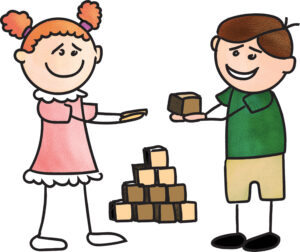By Nadine Briggs and Donna Shea
During a social group last week, a group of 9 year old boys decided to have a “Connect 4” tournament. They had figured out how to have two games going with the winner of each to play each other and so on. All  was going relatively well until one player suggested they try a“Connect 6” version. Mayhem ensued. This seemingly innocent suggestion was met with a fair amount of yelling. “NO WAY! We ‘re playing Connect FOUR!” and “THAT”S NOT GONNA WORK!” The yelling response is a blog for another day and, quite frankly, why some of the kids are in a social group. But the mere suggestion that the group play by a different set of rules set them off. Changing the rules or the way the game is played is common among kids. The adult perspective is that they like to add their own “flair” to games or it’s just their imaginations coming out to play. The peer perspective is that they are ruining the game.
was going relatively well until one player suggested they try a“Connect 6” version. Mayhem ensued. This seemingly innocent suggestion was met with a fair amount of yelling. “NO WAY! We ‘re playing Connect FOUR!” and “THAT”S NOT GONNA WORK!” The yelling response is a blog for another day and, quite frankly, why some of the kids are in a social group. But the mere suggestion that the group play by a different set of rules set them off. Changing the rules or the way the game is played is common among kids. The adult perspective is that they like to add their own “flair” to games or it’s just their imaginations coming out to play. The peer perspective is that they are ruining the game.
Playing by the rules is one of the key elements of good sportsmanship. Here are a few tips for following the rules from our soon-to-be-released book, I Need to Win! Tips for Kids on Good Sportsmanship.
- Reviewing the rules before playing can help to avoid confusion or disagreements. If there is a disagreement on the rules, a good plan is to check the rules. People may have different ways of playing a game. The internet is a good place to check for official rules (kids should check with an adult before going online).
- If everyone agrees to change a rule, then it is okay to use the new rule (but everyone must agree to the change).
- “Customizing” the rules or changing them constantly to a person’s own advantage will be annoying to other people trying to play.
- Kids should be encouraged to play strategically (making the best move available) instead of revengefully (getting even with someone for something they did to you in the game). There are fewer arguments when everyone plays strategically.
Playing by the rules is one aspect of good sportsmanship that kids should keep in mind. Sometimes kids can be so focused on winning that they don’t see the longer impact of not playing by the rules. Children will not want to play with kids if the play becomes frequently frustrating. It is an often unnecessary source of conflict that can be avoided. For more tips on good sportsmanship and friendship, check out our book series on Amazon.com.
Nadine Briggs, Director of Simply Social Kids and Donna Shea, Founder of the Peter Pan Center for Social and Emotional Growth are authors of the How to Make and Keep Friends books series. They specialize in creating simple tips that teach kids with social challenges the social language of friendship.

